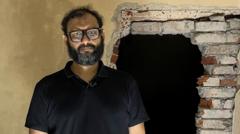A recently uncovered set of secret incarceration facilities near Dhaka's International Airport sheds light on a disturbing pattern of political repression. Former detainees describe systematic experiences of torture and abuse by elite security forces. As Bangladesh navigates its transition following ousted leader Sheikh Hasina, survivors demand justice and accountability.
Secret Prisons Uncovered Near Dhaka Airport: Survivors Speak Out

Secret Prisons Uncovered Near Dhaka Airport: Survivors Speak Out
Investigations reveal clandestine jails operated by a counter-terrorism unit under orders from former Prime Minister Sheikh Hasina, as victims recount harrowing experiences of abuse and fear.
Investigators in Bangladesh have unveiled a clandestine network of secret jails, shockingly located just a short distance from Dhaka's International Airport. The discovery was made possible through the courageous testimonies of former detainees, notably Mir Ahmad Bin Quasem, who spent eight harrowing years confined in one of these facilities. Quasem's recollections—particularly his memories of airplane sounds—proved crucial in locating the buildings concealed behind brick walls.
The investigation into these covert detention centers followed the ouster of Prime Minister Sheikh Hasina's government amid mass protests in August 2024. Reports of widespread unlawful killings and enforced disappearances have surfaced, implicating a special counter-terrorism unit, the Rapid Action Battalion (RAB), in acts carried out allegedly with the approval of the Hasina administration. The Awami League party, however, has distanced itself from the alleged abuses, claiming ignorance of the actions taken by the military establishment.
Quasem recalls his time in captivity with pain and clarity, reflecting that “it felt like being buried alive.” The small cells—several reported to be akin to torture chambers—provided no daylight and were starkly filled with the rubble from hasty attempts to erase evidence of abuse. As he guides investigators through the dimly lit tunnels, he expresses a resolute need for the world to understand what he and countless others endured.
The secret prison network appears to be extensive, with prosecutor Tajul Islam stating that hundreds of similar cells exist across the country. Eyewitness accounts reveal alarming similarities in the treatment of detainees, including psychological and physical torture, thereby raising serious questions about the judicial and human rights situation in Bangladesh.
Victims like Atikur Rahman Rasel and Iqbal Chowdhury describe the lingering trauma of their experiences—Rasel still bears the physical scars and emotional torment of inhumane treatment after his wrongful detention due to perceived political affiliations. Chowdhury, who claims he was tortured for criticizing the government, recalls a chilling warning from his captors about the dangers of speaking out.
Despite the overwhelming testimonies, a climate of fear remains pervasive among survivors, many of whom live in constant dread of encountering their former captors. With reports documenting the enforced disappearances of over 700 individuals since 2009, human rights organizations fear a cover-up of the broader scope of abuse.
The political and military establishment has denied involvement, portraying accusations as disconnected from reality. Former detainees and their advocates, however, remain steadfast in their pursuit of accountability and justice, urging for a transparent judicial process that could serve as a deterrent to future abuses.
As Bangladesh embarks on a critical juncture in its political landscape, resolving these issues of state-sponsored violence will be vital in forging a path toward reform and reparation for victims while solidifying the principles of democracy in the nation. Quasem summarizes the sentiments of so many: “We need to ensure justice for those who didn’t return and support those who survived."





















